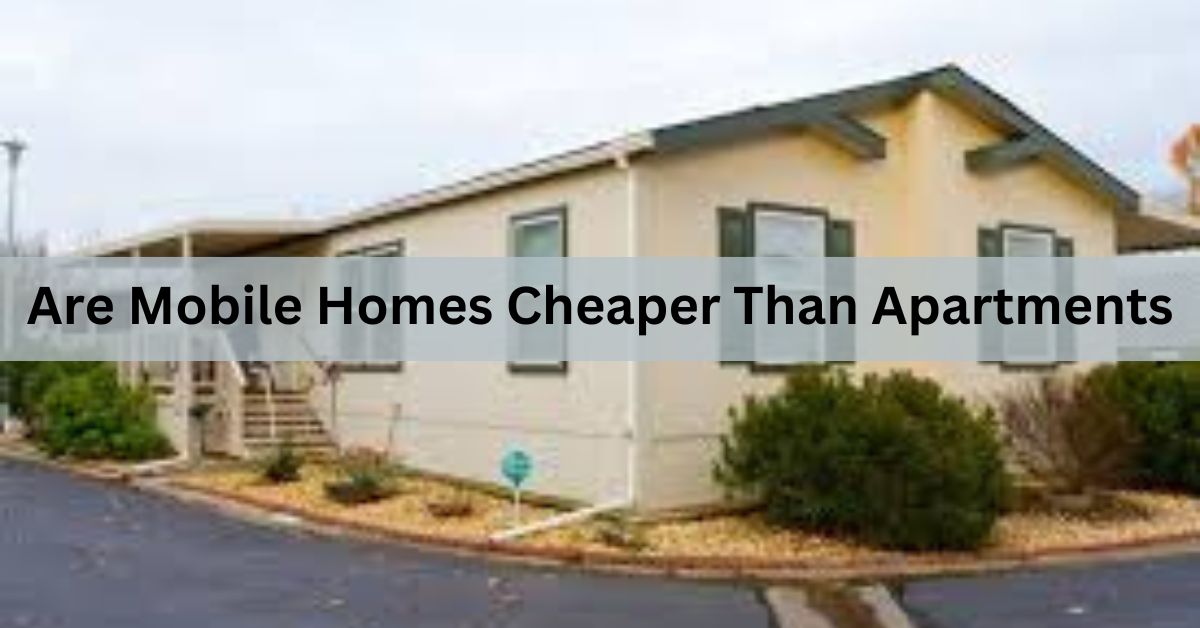Mobile homes are often cheaper in the long run but come with higher upfront and maintenance costs. Apartments offer predictable expenses and urban convenience, ideal for flexibility.
In this article, we’ll explore the key question: “Are mobile homes actually cheaper than apartments?” From upfront costs to monthly expenses, we’ll break down each option to help you decide which is truly more affordable and best fits your lifestyle.
Upfront Costs: Understanding Initial Financial Barriers:
Mobile Homes:
- Purchase Price: Buying a mobile home means paying a one-time purchase price, similar to a down payment on a house but generally more affordable. For a single-wide mobile home (typically about 600–1,200 square feet), you can expect prices to start around $40,000 and go up to $80,000. Double-wide homes (around 1,000–2,000 square feet) can range from $80,000 to $150,000 or more. High-end or custom mobile homes can even exceed these prices.
- Land Costs: If you’re buying a mobile home on its own, you’ll also need land, which can be a significant additional cost unless you rent a lot in a mobile home park.
- Setup and Installation Fees: After purchasing, a mobile home often requires transportation to your land or lot, setup, and sometimes utility hookups. These costs range between $5,000 and $10,000 on average, depending on location and required setup work.
- Financing Options: Mobile homes are often financed with “chattel loans,” which typically have higher interest rates than mortgages. If the mobile home isn’t permanently fixed to a foundation, it may depreciate over time, which affects resale value but also lowers insurance rates.
Apartments:
- Security Deposit: Apartment rentals typically require a refundable security deposit, which usually equals one month’s rent. This cost can be significant but is usually returned after you move out, as long as the apartment is in good condition.
- Application and Move-In Fees: Landlords or apartment complexes often require application fees, which cover background checks and administrative processing. This can add $50–$100 to your upfront costs.
- First and Last Month’s Rent: Many apartments require first and last month’s rent to be paid upfront, which can be a substantial amount in high-rent areas. This cost, however, is part of the rent rather than an additional fee.
Verdict on Upfront Costs: Apartments require less upfront investment but offer no ownership benefits, while mobile homes have higher initial costs with the potential for ownership, allowing you to build equity over time.
Monthly Living Costs: Breaking Down the Long-Term Expenses:
Mobile Homes:
- Loan Payments: If you’ve financed your mobile home, you’ll typically have a monthly payment. For a $60,000 mobile home loan at around 6% interest, expect a monthly payment of roughly $500–$600. Financing terms vary widely, with loan periods usually spanning 15–20 years.
- Lot Rent: Many mobile home owners rent a lot in a mobile home park. Lot rent averages between $300 and $700 per month but can be significantly higher in certain markets. This rent covers space and often includes some utilities like water or trash.
- Land Ownership: If you own land, monthly lot fees are eliminated, making long-term mobile home living much more affordable.
Apartments:
- Rent: Rent prices for apartments vary widely based on location, size, and amenities. Nationwide, the average one-bedroom apartment rent is around $1,400 per month. However, in cities like New York, San Francisco, or Seattle, this price can exceed $2,000 for a small studio. In suburban or rural areas, rents are more affordable, generally around $800 to $1,200 for similar spaces.
- Utility Costs: Apartments may include utilities like water and trash collection in the rent. However, renters are typically responsible for gas, electricity, and internet. These costs can range between $100 and $200 per month, depending on apartment size and usage.
Verdict on Monthly Living Costs: Mobile homes generally have lower monthly costs than apartments, especially if lot rent or mortgage payments are minimized by owning the land outright. However, apartment rent is often predictable and includes utility coverage, offering budget stability.
Maintenance and Utility Costs: A Closer Look:
Mobile Homes:
- Utilities: Mobile homes usually have separate utilities for water, electricity, gas, and trash, with costs varying by usage. On average, utility costs are about $200–$300 per month, though costs may increase in older homes with less insulation.
- Maintenance Costs: Owning a mobile home means you’re responsible for maintenance and repairs, which can add unpredictability to your budget. Regular upkeep costs can be around $100–$150 a month for minor repairs. Major repairs, such as replacing the roof or HVAC systems, can cost thousands. Mobile homes are also more vulnerable to weather damage, which may increase maintenance expenses over time.
Apartments:
- Utilities: Some apartments include utilities as part of the rent, which can save tenants money and simplify budgeting. Typically, water, trash, and sewer fees are included, while electricity, internet, and gas are paid separately.
- Maintenance Costs: In an apartment, landlords usually cover maintenance and repairs, which means tenants don’t have to worry about unexpected costs. This is especially advantageous in the case of major issues like plumbing or appliance repair.
Verdict on Maintenance and Utility Costs: Apartments are lower in maintenance costs, while mobile homes require budgeting for potential repairs. However, those who prefer control over their space may find that mobile homes offer more freedom.
Location, Flexibility, and Resale Value Considerations:
Mobile Homes:
- Location Flexibility: Mobile homes are often found in suburban or rural areas where land costs are lower. This can allow owners to live in quieter areas with more space, but it can mean longer commutes or fewer urban amenities.
- Resale Value and Depreciation: Unlike traditional homes, mobile homes tend to depreciate unless they’re attached to land, making them less of a financial investment. However, they offer a stepping stone to traditional homeownership, especially if land ownership is part of the plan.
Apartments:
- Urban Access: Apartments are often in cities or urban areas, making them ideal for those who prioritize accessibility to work, public transport, and city amenities. This is especially beneficial in high-cost urban areas where commuting time and expenses can be high.
- No Resale Value: Renting an apartment offers no financial appreciation or equity, which can be a drawback for those looking to invest in a long-term asset. However, it allows for greater mobility if moving becomes necessary.
Verdict on Location and Value: Mobile homes are a better choice for those looking for rural affordability and long-term savings, while apartments offer a more convenient lifestyle for urban living without the need for ownership.
Long-Term Financial Impact: Which Option Builds More Value Over Time?
Mobile Homes:
- Equity and Ownership: Mobile homes, even if depreciating, offer a way to build some equity over time. If you own the land, you’ll retain that value, which can appreciate based on real estate trends. This can make mobile homes a reasonable investment in affordable housing markets.
- Cost Savings in Retirement: Mobile homes with no mortgage or lot rent can significantly reduce living expenses in retirement. This allows for lower fixed costs, ideal for those on a fixed income.
Apartments:
- Predictable Monthly Costs: Apartments provide financial predictability since major repairs are covered by the landlord, and rent is usually stable or increases gradually. This is ideal for those who prefer budgeting ease and predictability.
- Rental Market Trends: While predictable, rent prices generally increase over time. Without ownership, long-term apartment living can mean higher monthly payments as rents rise, especially in high-demand urban areas.
Verdict on Long-Term Financial Impact: Mobile homes are generally a better option for those looking to build some long-term value, especially when land ownership is involved. Apartments, however, offer financial stability for those who prioritize convenience and flexibility.
FAQ’s:
Are mobile homes cheaper than apartments overall?
Yes, mobile homes tend to be more affordable over time, especially if you own the land.
What are the initial costs for mobile homes versus apartments?
Mobile homes require a purchase price and setup fees, while apartments need a deposit and possibly first and last month’s rent.
Which option has lower maintenance costs?
Apartments typically have lower maintenance costs, as landlords handle repairs, unlike mobile homes, where owners are responsible.
Do mobile homes offer long-term financial benefits?
Yes, mobile homes can build equity if you own the land, whereas apartments do not build equity.
Which is more suitable for city living?
Apartments are better for urban living due to convenience and accessibility, while mobile homes are often found in suburban or rural areas.
Conclusion
Mobile homes can often be the cheaper option, particularly for those looking for a long-term solution with ownership potential, especially in less urban settings. However, for those who need flexibility, lower upfront costs, and urban convenience, apartments are ideal. Ultimately, the choice between a mobile home and an apartment comes down to lifestyle, financial goals, and where you envision living over the next several years.
I’m Arlo Liam, and I bring over 10 years of hands-on experience in the mobile technology field. My journey in mobile technology has been driven by a passion for innovation, usability, and the evolving digital landscape.
From understanding the inner workings of smartphones to exploring emerging trends in mobile software and app development, I am committed to sharing in-depth insights and practical knowledge with users of all levels.



